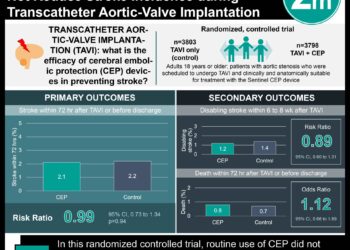#VisualAbstract: Polypill plus aspirin treatment decreases cardiovascular event incidence
1. Polypill plus aspirin treatment was shown to decrease the incidence of cardiovascular events compared to placebo in patients without cardiovascular disease.
2. Adverse events such as hypotension and dizziness were shown to be higher in the polypill-only group compared to the placebo group.
Evidence Rating Level: 1 (Excellent)
Study Rundown: Polypills combining blood pressure (BP) and low-density lipoprotein (LDL) medications have been used to treat populations at risk for cardiovascular disease. The International Polycap Study 3 (TIPS-3) efficacy trial assessed whether treatment with a polypill alone, aspirin alone, or their combination would reduce the incidence of cardiovascular events among patients without cardiovascular disease. This randomized trial provides evidence that combination treatment with a polypill plus aspirin compared to placebo led to a lower incidence of cardiovascular events amongst participants with intermediate cardiovascular risk. Limitations pertinent to the trial include a lack of 5-year follow-up data, an underestimate of the true effect of treatment due to logistical obstacles, and an underestimation of the number of persons experiencing side effects. Nonetheless, the study’s results were significant as a polypill and aspirin treatment strategy reduced the incidence of cardiovascular events.
Click to read the study in NEJM
Relevant Reading: Effectiveness of polypill for primary and secondary prevention of cardiovascular diseases (PolyIran): a pragmatic, cluster-randomised trial
In-Depth [randomized controlled trial]: This randomized, controlled trial enrolled 5,713 participants at 86 centers in nine countries. Men 50 years of age or older and women 55 years of age with an INTERHEART Risk Score greater than or equal to 10 were included in the study. Patients with known cardiovascular disease were excluded from the study. Patients were randomized with a 2-by-2-by-2 factorial design into polypill (simvastatin 40 mg, atenolol 100 mg, hydrochlorothiazide 25 mg, ramipril 10 mg), aspirin (75 mg), and polypill plus aspirin, respectively. The primary outcome, with respect to the polypill and polypill plus aspirin groups, was death from cardiovascular causes, stroke, myocardial infarction, heart failure, resuscitated cardiac arrest, and arterial revascularization. The primary outcome, with respect to the aspirin group, was death from cardiovascular causes, myocardial infarction, or stroke. Overall, 126 participants (4.4%) in the polypill group experienced primary outcomes compared with 157 (5.5%) participants in the placebo group (hazard ratio [HR], 0.79; 95% confidence interval [CI], 0.63 to 1.00). Additionally, more participants in the polypill group compared to placebo stopped the trial regimen because of dizziness (polypill, 28 patients; placebo, 17 patients), hypotension (polypill,51 patients; placebo, 14 patients), or cough (polypill, 31 patients; placebo, 17 patients). Furthermore, 116 participants (4.1%) in the aspirin group compared to 134 participants (4.7) in the placebo group experienced primary outcomes (HR, 0.86; 95% CI, 0.67 to 1.10). Finally, 59 participants (4.1%) in the polypill plus aspirin group experienced primary outcomes compared to 83 participants (5.8%) in the double placebo group (HR, 0.69; 95% CI, 0.50 to 0.97). Overall, the polypill plus aspirin treatment resulted in a decrease in cardiovascular events incidence for patients without known cardiovascular disease.
©2021 2 Minute Medicine, Inc. All rights reserved. No works may be reproduced without expressed written consent from 2 Minute Medicine, Inc. Inquire about licensing here. No article should be construed as medical advice and is not intended as such by the authors or by 2 Minute Medicine, Inc.






